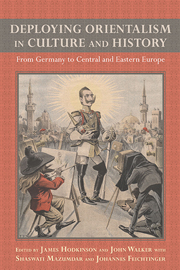Book contents
- Frontmatter
- Contents
- Preface
- Introduction
- 1 (Re)translating the West: Humboldt, Habermas, and Intercultural Dialogue
- 2 Friedrich Schlegel's Writings on India: Reimagining Germany as Europe's True Oriental Self
- 3 Germany's Local Orientalisms
- 4 Tales from the Oriental Borderlands: On the Making and Uses of Colonial Algiers in Germanophone Travel Writing from the Maghreb around 1840
- 5 The Jew, the Turk, and the Indian: Figurations of the Oriental in the German-Speaking World
- 6 M. C. Sprengel's Writings on India: A Disenchanted and Forgotten Orientalism of the Late Eighteenth Century
- 7 Occident and Orient in Narratives of Exile: The Case of Willy Haas's Indian Exile Writings
- 8 Distant Neighbors: Uses of Orientalism in the Late Nineteenth-Century Austro-Hungarian Empire
- 9 Modes of Orientalism in Hungarian Letters and Learning of the Nineteenth and Twentieth Centuries
- 10 Where the Orient Ends? Orientalism and Its Function for Imperial Rule in the Russian Empire
- 11 Noncolonial Orientalism? Czech Travel Writing on Africa and Asia around 1918
- 12 Oriental Sexuality and Its Uses in Nineteenth-Century Travelogues
- Notes on the Contributors
- Index
8 - Distant Neighbors: Uses of Orientalism in the Late Nineteenth-Century Austro-Hungarian Empire
Published online by Cambridge University Press: 05 December 2013
- Frontmatter
- Contents
- Preface
- Introduction
- 1 (Re)translating the West: Humboldt, Habermas, and Intercultural Dialogue
- 2 Friedrich Schlegel's Writings on India: Reimagining Germany as Europe's True Oriental Self
- 3 Germany's Local Orientalisms
- 4 Tales from the Oriental Borderlands: On the Making and Uses of Colonial Algiers in Germanophone Travel Writing from the Maghreb around 1840
- 5 The Jew, the Turk, and the Indian: Figurations of the Oriental in the German-Speaking World
- 6 M. C. Sprengel's Writings on India: A Disenchanted and Forgotten Orientalism of the Late Eighteenth Century
- 7 Occident and Orient in Narratives of Exile: The Case of Willy Haas's Indian Exile Writings
- 8 Distant Neighbors: Uses of Orientalism in the Late Nineteenth-Century Austro-Hungarian Empire
- 9 Modes of Orientalism in Hungarian Letters and Learning of the Nineteenth and Twentieth Centuries
- 10 Where the Orient Ends? Orientalism and Its Function for Imperial Rule in the Russian Empire
- 11 Noncolonial Orientalism? Czech Travel Writing on Africa and Asia around 1918
- 12 Oriental Sexuality and Its Uses in Nineteenth-Century Travelogues
- Notes on the Contributors
- Index
Summary
In contrast to Edward Said's classical model, modes of so-called orientalist thinking and writing in the Habsburg monarchy provide a more differentiated idea of the Orient. It would be inaccurate to speak of just one form of orientalist discourse in the late Habsburg Empire. This chapter will consider at least two variants, outlining and then illustrating them through quotations from influential Austro-Hungarian policymakers. One variant represents the image of the Orient as “distant” (referring to the ottoman Empire and the Turks, who were both kept at a distance in consequence of their defeat at the gates of Vienna in 1683, commemorated at the bicentennial celebrations), while the other conceives the Orient as “close to home” (Bosnia-Herzegovina and the Southern Slavic peoples); both variants were deployed, mainly for political reasons, by various protagonists. Both modes of thinking were decisively affected by two events: the occupation and later annexation of the former Ottoman provinces Bosnia and Herzegovina in the year 1878, and in 1883 the bicentennial anniversary of the siege of Vienna by the Turks (1683) and its victorious relief. This chapter seeks to reconstruct precisely this complexity and differentiation within Habsburg discourses on the Orient during the period in question.
- Type
- Chapter
- Information
- Deploying Orientalism in Culture and HistoryFrom Germany to Central and Eastern Europe, pp. 148 - 165Publisher: Boydell & BrewerPrint publication year: 2013



